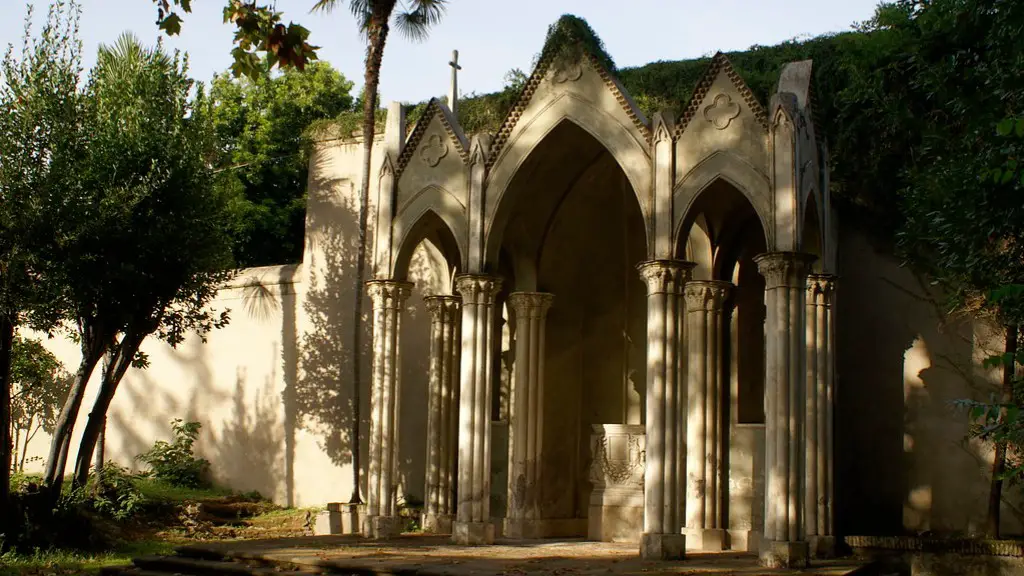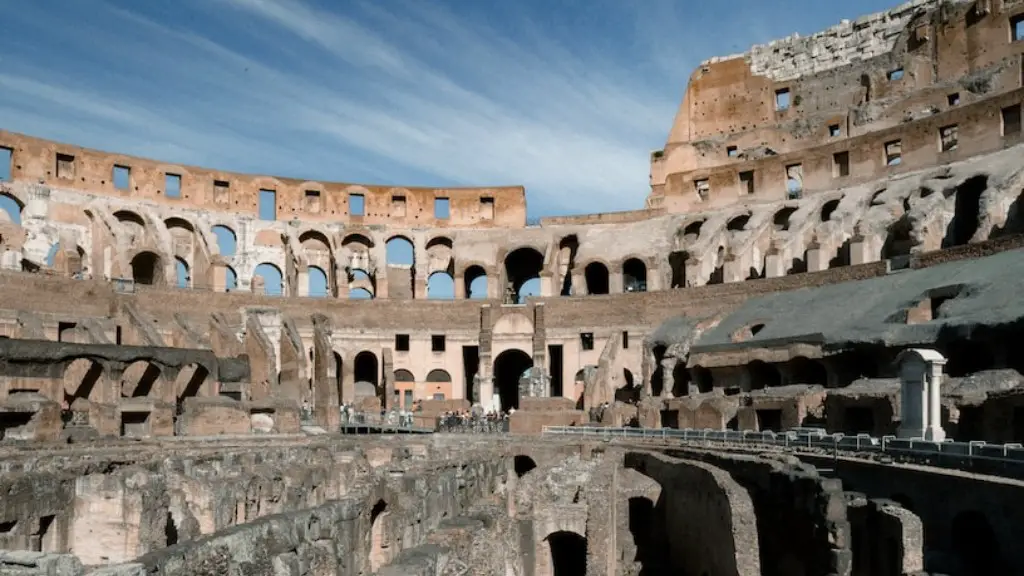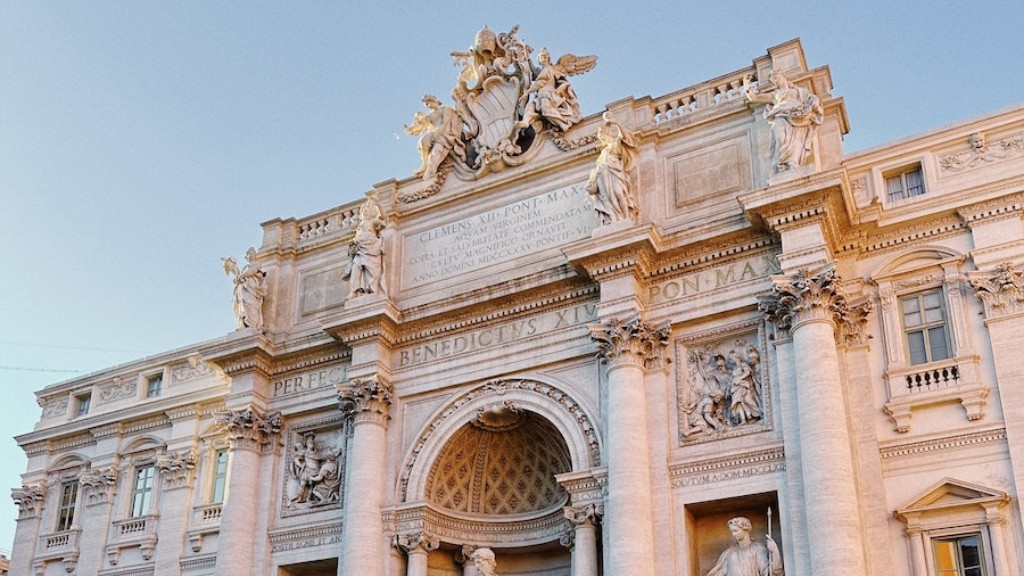Overview of Ancient Roman Religion
Ancient Roman religion was a complex and ever-changing phenomenon that combined the ancient Greek gods and pantheon with the local deities of Latium and the Sabine hills. Roman religion was heavily influenced by Etruscan culture, with a belief system centred around the concept of the paterfamilias, the family’s ancestor-hero or protector. As Rome grew, their gods and religions changed and adapted to new political and cultural influences. Religion was an important part of everyday life in Rome. Religious rituals were an integral part of daily life, and were elaborate and often featured animal sacrifices.
Creation of Religions in Ancient Rome
The creation of religions in Ancient Rome dates back to the beginning of the city’s founding. Initially, the inhabitants of Rome followed the traditional religious beliefs of the Latin people, and worshipped their ancestral gods. This type of traditional worship was intertwined with the agricultural cycle, honoring gods such as Janus and Saturn for their ability to bring prosperity and fertility. As Rome gained power, it absorbed new gods and religions from other cultures, including the gods of Greece, Egypt, and other Mediterranean regions. Through the conquest of new territories, the Romans adopted new gods and rituals, an example being the adoption of the cult of Mithras from conquered Persian peoples. This worshipping of different gods was not exclusive as the Romans also sought to harmonize the gods they had adopted, leading to the scholarly interpretation of syncreticism. Ultimately, the Romans had combined the worship of hundreds of gods from a variety of different cultures, leading to a complex system of beliefs that underpinned Roman religion.
Role of the State in Ancient Roman Religion
The Roman state was a central part of Ancient Roman religion and had a significant impact on the religion. The state played an important role in the official recognition of cults and gods, only recognizing those which were thought to have beneficial effects on the Roman people. In this sense, the state had a role in the promotion of official Roman religion. This was evidenced by the creation of priestly colleges, such as the College of Pontiffs which was responsible for the regulation of religious laws. The state was also responsible for religious ceremonies, such as those held at the Roman Forum. Furthermore, the state had the power to choose priests of various cults as well as regulate orators, who were responsible for delivering publicly recognized and accepted cult rites.
Rome’s Adoption of Christianity
One of the most significant events in Ancient Roman religion was the conversion of the Roman Empire to Christianity. This conversion began in AD 313, when Emperor Constantine the Great abolished the persecution of Christians and began the process of legal recognition that would ultimately lead to the establishment of Christianity as the state religion by the time of Theodosius I. The adoption of Christianity in Ancient Rome had a huge impact on the practice of religion in Rome, with Christian beliefs and customs becoming the primary focus of religious practice from then on. This led to a decline in the practice of traditional Roman religion, as the practices of ancient cults and gods were mostly relegated to the category of superstitions and magick.
Ancient Roman Religious Beliefs
The core of Ancient Roman religion was the worship and celebration of various gods, with particular focus given to gods of the city such as Jupiter, Juno and Minerva. Central to this idea was the concept of the paterfamilias, honouring the family’s ancestor-hero or protector, who had control and authority over the lives of his family. In this sense, much of Ancient Roman religious belief was focussed on the veneration of household gods. Sacrifice was also a big part of Ancient Roman religion, with animal and grain offerings made to a range of different gods. Religious rituals were rituals were also a large part of life, with certain religious rites marked as important and celebrated throughout the city.
Effects of Ancient Roman Religion on Modern Times
The legacy of Ancient Roman religion can still be seen in modern times in various ways. Christianity was the main religion that emerged from Rome’s religious practices, and its beliefs and practices continue to be popular in Europe and the wider world today. Furthermore, their gods and goddesses continue to be celebrated in popular culture, with many of the gods being given their own unique interpretations in various forms of media. This has also created a new tradition of worshipping and veneration of these characters, with modern devotees paying homage to these deities just as the Roman people did centuries ago.
Debate Surrounding Ancient Roman Religion
There have been a number of debates surrounding Ancient Roman religion and its influence on modern cultures. Some scholars argue that the impact of Ancient Rome on modern religion has been more subtle than is often acknowledged, noting that many of the popular ideas about the gods and goddesses of Rome are rooted in modern manifestations of Greco-Roman mythology. Others have argued that Ancient Rome’s pantheon of gods and goddesses has served as a source of inspiration for modern literature and art. Furthermore, there has been debate around the cultural and political implications of Ancient Rome’s religious beliefs and practices, and the extent to which they shaped the world we live in today.
The Impact of Ancient Religion on History
The impact of Ancient Roman religion on history is extensive. The conversion of the Roman Empire to Christianity had far reaching political and social implications which continue to be felt to this day. Ancient Roman gods, such as Jupiter and Mars, still have an influence on popular culture, often serving as symbols in art, literature and even modern popular music. Moreover, Ancient Roman religious practices, including animal sacrifices, continue to form the basis for some of the religious practices and customs in modern societies. Additionally, many of the social and cultural conventions that developed during the peak of Ancient Roman religion still influence the way we think about religion and life in general today.
Veneration of Ancient Roman Deities
Despite the fall of the Roman Empire and the adoption of Christianity as its official religion, the veneration of Ancient Roman gods and goddesses can still be found in modern times in various forms. In some cases, modern devotees have attempted to revive some of the ceremonies and religious practices of Ancient Rome in its original form. Moreover, Ancient Roman gods and goddesses continue to be celebrated in various modern forms of art, often adorning the covers of books or featuring in popular films and television shows. Additionally, various religious organizations and occultist movements still pay homage to the gods of Ancient Rome, and venerate the gods in their own unique ways.
What Role Did the Pantheon Play in Roman Society?
The pantheon of Ancient Roman gods and goddesses was a major influence on Roman society, forming the basis for many of their cultural and religious beliefs. This pantheon contained a variety of gods and goddesses, each with their own distinct purpose and specific areas of influence. Through the pantheon, the Romans believed that their lives were controlled and directed by the divine, and it shaped their ideas about the afterlife and the Gods’ will. Furthermore, the pantheon was closely linked to public festivals and rituals that were a prominent feature of Roman life, such as the opening of the temple doors during the festival of the Vestal Virgins. Through its symbolism, mythology and power, the tradition of the Roman pantheon has had a lasting effect on the culture and religious practices of modern societies.
Significance of Ancient Roman Religion
The legacy of Ancient Roman religion still plays an important role in modern times. Ancient Roman religious beliefs and practices helped to shape religions and cultural norms around the world, particularly in Europe and the United States. Ancient Roman religion also formed the basis for many Western philosophical and religious traditions which are still adhered to today. Additionally, the pantheon of Roman gods and goddesses continue to be celebrated in various forms of art, literature and popular culture, often being reinvented to suit the needs and beliefs of modern society. All of these areas have been significantly influenced by the Ancient Roman religious traditions that served as the foundation for modern day beliefs.


